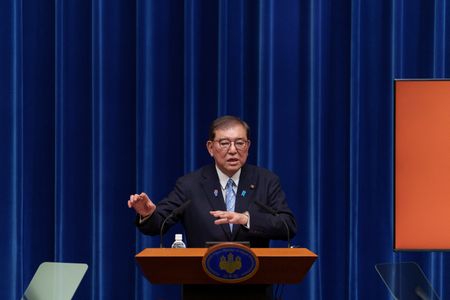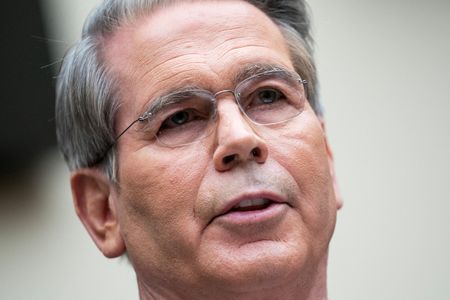By Leika Kihara
TOKYO (Reuters) -Japanese Prime Minister Shigeru Ishiba said on Monday the government was ready to take further steps to cushion the economic blow from higher U.S. tariffs, but signalled caution on cutting the country’s consumption tax rate.
Opposition and some ruling party lawmakers have called on the government to cut Japan’s consumption tax rate, set at 10% except for food items that are charged 8%, to help households cope with the rising cost of living.
Speaking in parliament, Ishiba said the government “won’t hesitate to take additional measures” to ease the pain on the economy from higher U.S. tariffs.
But he said any steps must be targeted to households hardest hit rather than those covering the broad population, suggesting that a cut to Japan’s consumption tax rate was unlikely.
“It’s important to reach out to people hardest hit,” rather than taking blanket measures, Ishiba told parliament when asked by an opposition lawmaker whether the government could consider cutting the consumption tax rate for food items.
While some countries have resorted to tax cuts focusing on food items, Japan already has a fairly low tax rate, a rapidly ageing population and a dire fiscal state, Ishiba said.
“It’s easy to talk about cutting tax. But it’s irresponsible not to also discuss more difficult issues” such as how to pay for Japan’s rising social welfare and pension costs, he said.
Japan’s consumption has been stagnating even before the steep tariffs announced by President Donald Trump in April. Analysts polled by Reuters expect Japan’s economy to have contracted for the first time in a year in the first quarter. The first-quarter preliminary gross domestic product (GDP) data is due on Friday.
A total of 826 companies went under in April, up 8.7% from year-before levels and increasing for the 36th straight month, a survey by private think tank Teikoku Databank showed on Monday.
Japan’s service-sector sentiment worsened in April, according to a government survey released on the day – the latest sign U.S. tariffs were beginning to take a toll on the fragile economy.
The strife was evident in Japan’s automobile sector, with Mazda reporting a 45.1% drop in net profits for the fiscal year that ended in March, and holding off on disclosing earning estimates for the current year through March 2026.
Despite these signs of weakness in the economy, Japan’s dire finances limit scope for big spending or permanent tax cuts.
Japan’s public debt, at double the size of its economy, is the largest among major countries due to decades of heavy spending including for social welfare costs of a rapidly ageing population.
The cost of funding the huge public debt is expected to rise as the Bank of Japan normalises monetary policy by tapering its bond buying and raising short-term interest rates.
Super-long bond yields rose to a more than two-decade high this month due in part to investors’ concern that Japan’s fiscal state may worsen further, as talk of tax cuts among politicians gather steam ahead of an upper house election slated for July.
(Reporting by Leika KiharaEditing by Shri Navaratnam)









